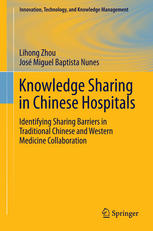

Most ebook files are in PDF format, so you can easily read them using various software such as Foxit Reader or directly on the Google Chrome browser.
Some ebook files are released by publishers in other formats such as .awz, .mobi, .epub, .fb2, etc. You may need to install specific software to read these formats on mobile/PC, such as Calibre.
Please read the tutorial at this link: https://ebookbell.com/faq
We offer FREE conversion to the popular formats you request; however, this may take some time. Therefore, right after payment, please email us, and we will try to provide the service as quickly as possible.
For some exceptional file formats or broken links (if any), please refrain from opening any disputes. Instead, email us first, and we will try to assist within a maximum of 6 hours.
EbookBell Team

4.3
28 reviewsThis book aims to identify, understand and qualify barriers to the patient-centred knowledge sharing (KS) in interprofessional practice of Traditional Chinese Medicine (TCM) and Western Medicine (WM) healthcare professionals in Chinese hospitals. This collaboration is particularly crucial and unique to China since, contrary to Western practice, these two types of professionals actually work together complimentary in the same hospital. This study adopted a Grounded Theory approach as the overarching methodology to guide the analysis of the data collected in a single case-study design. A public hospital in central China was selected as the case-study site, at which 49 informants were interviewed by using semi-structured and evolving interview scripts. The research findings point to five categories of KS barriers: contextual influences, hospital management, philosophical divergence, Chinese healthcare education and interprofessional training. Further conceptualising the research findings, it is identified that KS is mostly prevented by philosophical and professional tensions between the two medical communities. Therefore, to improve KS and reduce the effects of the identified barriers, efforts should be made targeted at resolving both types of tensions. The conclusion advocates the establishment of national policies and hospital management strategies aimed at maintaining equality of the two medical communities and putting in place an interprofessional common ground to encourage and facilitate communication and KS.